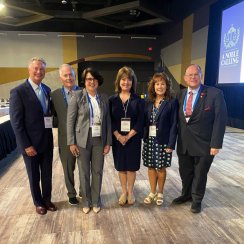Contact center of the Ukrainian Judiciary 044 207-35-46

The annual convention of the Kentucky Bar Association (USA) was held under the slogan "A Noble Calling" and brought together more than two thousand judges and attorneys. The conference discussed how to increase public understanding and trust in the rule of law and the justice system.
Olena Kibenko's speech was structured as an interview with a renowned international legal expert, Professor Gregory Gordon, who gave a brief overview of Ukraine's history. He talked about its formation as an independent state, the Revolution of Dignity, the war with Russia (since 2014), and demonstrated with slides how the front line changed in 2022-2024.
Olena Kibenko focused on the important question of how Ukraine maintains the rule of law in the country during the war. The Supreme Court judge told her colleagues about the functioning of the courts in the first months of the full-scale invasion and her personal experience, how the war affected the consideration of different categories of cases in all jurisdictions (change in workload, emergence of new categories of disputes), Ukraine's derogation from its obligations under the Convention for the Protection of Human Rights and Fundamental Freedoms and the International Covenant on Civil and Political Rights, whether Ukrainian society felt such derogation and how it affected judicial practice.
.jpg)
The speaker also answered questions from the audience on the need to establish military courts, the difficulties in establishing an international tribunal, the role of national courts and the International Criminal Court in ensuring accountability for crimes committed during the Russian aggression.
The issue of preventing and fighting corruption was discussed separately. As Olena Kibenko noted, while corruption used to hinder the development of Ukrainian society by "sucking" Ukrainian taxpayers' money out of the budget, today it poses a threat to the very existence of Ukraine as an independent state. Because of corruption, we may lose the money allocated for aid by our foreign partners, as well as their trust, which will lead to an inability to defend the country in the war with Russia. Ukraine's recovery process is also at risk, as investors will not invest in a corrupt country, even if it is heroically fighting the aggressor. However, according to Olena Kibenko, the high-profile corruption cases reported abroad also show that Ukrainian society has stopped tolerating corruption and is successfully fighting it. The Supreme Court judge also noted that while the process of investigation and prosecution used to take years and often ended in failure, today, thanks to the new anti-corruption structure, it takes only one to two years from the discovery of a crime to the delivery of a verdict.
.jpg)
Olena Kibenko's interview with Professor Gregory Gordon was chosen by the organisers as the spotlight of the first day of the conference and attracted a large audience of legal experts, including judges from the Kentucky Supreme Court.